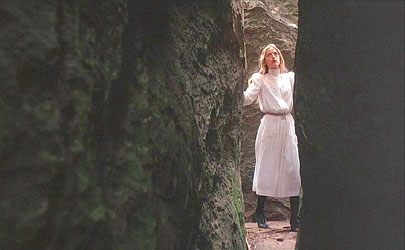
I love movies that can be appreciated intuitively on different levels without necesserily shifting into "now I'm reading the movie on a symbolic level" mode. Where the different possibilities for meaningful interpretation are left at the perimeter of the mind's eye never to be fully rationalized, hazy and elusive but nagging the viewer with a presence that can be felt, like glimpses through the shifting rents in a thick fog, bits of vivid and vanishing detail giving no connected idea of the general aspect but suggesting a vague outline. When Miss McCraw speaks about the volcanic rock they're visiting ("quite a recent eruption really, only a million years old. silicious lava forced u from deep below"), I can't shake off the impression that she's talking about the formation of something other than rocks, that it has nothing to do with the rock itself.
There's no solution offered to the mystery of the disappearence of two young college girls and their governess in a picnic in the eponymous hanging rock in turn-of-the-century Australia but Peter Weir offers us something better than a solution. The memory of its absence. We've all heard as children a mysterious/weird story with no definite conclusion ("and nobody knows what happened to him/her") and most of us probably stomped our feet wanting to know the end. The mystery is never allowed to be drawn to the arena of the conscious mind to be subjected there to the laws of reason. It lays there like a gapping black hole threatening to devour everything in the small Australian community. A question left unanswered threatens the stability of the town, as though the mystery of the missing girls is an affront to each one personally and an indictment of civilized man. The unspeakable remains unspeakable. With theories springing up among the townfolks to explain it (a lot of them indicating violence, suggesting rape, or worse), we can see the formation of taboo in society out of pure unblemished innocence.
The juxtaposition of Victorian values and the uncanny alien landscape against which they must fail is interesting on a scholarly level but not of personal value to me. What I like most is the pure mythical symbolism Weir uses in painting a picture of pure innocence (the girls reciting poems of love in their dorm and getting ready for the picnic) before sending it off to an ethereal otherworldly doom. The girls disappear inside the rock without violence or force, seemingly out of their own will, as though in trance or seduced by the rock itself. It reads like a modern parable of some ancient creation myth. All things enter the world pure and innocent but inadvertently have their innocence corrupted by the knowledge of that world. "All things end at the right time".
Despite what the unresolved ending would suggest, instead of the fleeting meaninglessness of life, it's that sense of teleological fatalism I get from Picnic. Some things have answers and some don't but the absence of us knowing the answers doesn't intimate an absence of design. Therein lies the power of Picnic because it's not narratively incomplete but only gives the appearence of being so, because it lingers and haunts while suggesting with a few strokes of the brush broader pictures that cannot be put in words or their magic evaporates, there the power of Weir's symbolism (even at its most hackneyed "swan-for-innocent-girl" metaphore) in never losing track of the archetypal while never allowing it to spiral out of touch with direct reality, in orchestrating a mystical ethereal trance of a movie that mystifies as much as the rock mystifies the girls.




Δεν υπάρχουν σχόλια:
Δημοσίευση σχολίου